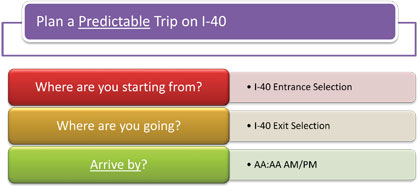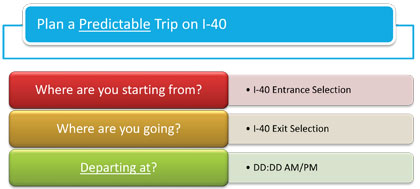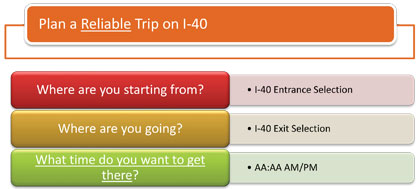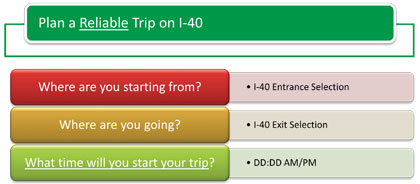Effectiveness of Disseminating Traveler Information on Travel Time Reliability: Implement Plan and Survey Results Report
APPENDIX J. TRIANGLE TRANSPORTATION STUDY WEBSITE CONCEPT
Slide 1
Triangle Transportation Study
Website Organization

Slide 2
Triangle Transportation Study
Main Page: Assembly A

Slide 3
Triangle Transportation Study
Main Page: Assembly B

Slide 4
Triangle Transportation Study
ASSEMBLY A (Arrival)

| For your trip on I-40: |
|---|
|
Reliability Data Needs
- Recommended departure time: Arrival Time – 95th Percentile Travel Time
- Majority of the time: 95th Percentile Travel Time
- Estimate travel time: Average Travel Time
- Extra time: Buffer Time (95th Percentile Travel Time – Average Travel Time)
Slide 5
Triangle Transportation Study
ASSEMBLY A (Departure)

| For your trip on I-40: |
|---|
|
Slide 6
Triangle Transportation Study
ASSEMBLY B (Arrival)

| For your trip on I-71: |
|---|
|
Slide 7
Triangle Transportation Study
ASSEMBLY B (Departure)

| For your trip on I-40: |
|---|
|
Reliability Data Needs
- recommended departure time / suggested departure time: Arrival Time – 95th Percentile Travel Time
- majority of the time / most of the time: 95th Percentile Travel Time
- estimated travel time / approximate travel time: Average Travel Time
- extra time / recommended cushion: Buffer Time (95th Percentile Travel Time – Average Travel Time)